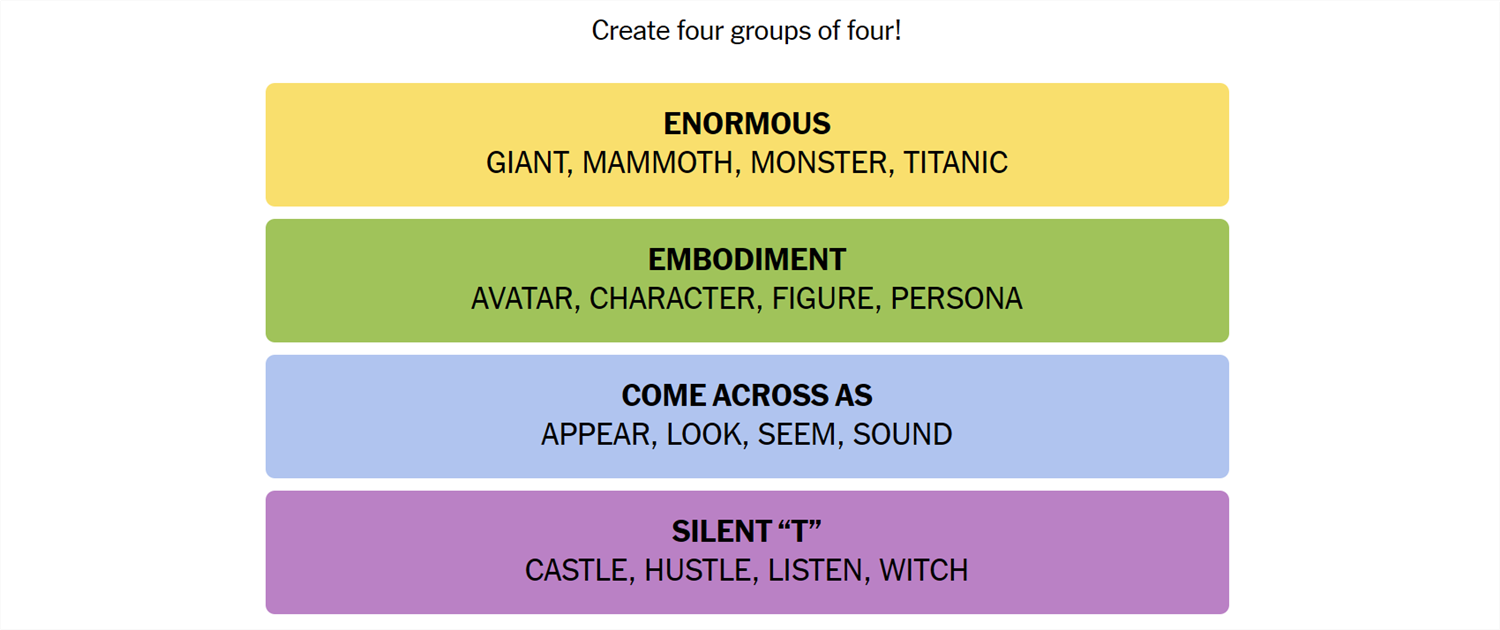Connections is a game from the New York Times that challenges you to find the association between words. It sounds easy, but it isn’t—Connections categories can be almost anything, and they’re usually quite specific. If you need a hand getting the answers, we’ve got you covered.
What Is Connections?
Connections is a game from the New York Times. The objective is simple: sort 16 words into groups of 4. Each group of words will be connected by some common idea or theme. That common element could be anything. We have seen everything from games that rely on the number of letters in the words to categories that require you to spot an extra letter at the end of the word. Sometimes they’re references to economics, other times they reference fairy tales. There is no telling what sort of association there will be between words.
Once you’re confident you understand the connection, select 4 words, then hit “Submit.” You have only four attempts in total, so don’t be too guess-happy.
Hints for Today’s Connections Groups
Here are a few hints for the 398th Connections game to get you started:
- Yellow: Think Big.
- Green: A depiction of a person or personality type.
- Blue: How something is perceived.
- Purple: A letter you don’t pronounce.
If you still need help, the actual group names are:
- Yellow: Enormous
- Green: Embodiment
- Blue: Come Across As
- Purple: Silent “T”
Today’s NYT Connections Answers
Enormous (Yellow):
Giant, Mammoth, Monster, Titanic
Embodiment (Green):
Avatar, Character, Figure, Persona
Come Across as (Blue):
Appear, Look, Seem, Sound
Silent T (Purple):
Castle, Hustle, Listen, Witch
How Did We Solve This Connections Game?
July 13th was refreshingly easy for me.
Mammoth and giant together instantly made me fondly recall Skyrim. After all, who doesn’t like getting launched into the stratosphere because of buggy physics? However, there weren’t any other Skyrim-related words (sadly), so I went with their mundane connection: really big! From there, it was easy to pick up monster and titanic. Together, giant, mammoth, monster, and titanic were in the Yellow group, “Enormous.”
Character, figure, persona, and avatar seem vaguely related, just intuitively. They’re all depictions of a person, personality type, or something like that. With nothing else strong to go on, I just guessed. They belonged to Green, which was “Embodiment.”
Appear, look, seem, and sound are all words we use to describe how something is perceived by others. Again, it seemed like a strong enough connection to merit a guess. The Blue group was “Come Across As.”
That left castle, hustle, listen, and witch. I didn’t catch the connection until I actually muttered the words out loud while reading them: they all have a “Silent T” in them, which was also the name of the Purple group.
How Do You Guess Connections Groups?
There is no quick, reliable way to approach Connections like there is with Wordle, since Connections isn’t algorithmic. However, there are a few things to keep in mind that can help.
- Look for similar parts of speech. Are some words verbs and others nouns? Are some adjectives? Try mentally grouping them based on those categories and see if any other patterns jump out at you.
- Are the words synonyms? Sometimes categories will just be synonyms for a phrase, or very close to synonyms. Don’t rely too closely on this, though. Occasionally, Connections will deliberately throw in words that are sometimes synonyms to mislead you.
- Try saying the words. Sometimes, saying the words helps. One puzzle we saw included the words go, rate, faster, clip, pace, speed, move, commute, and hurry—all of which are obviously related to the idea of motion. However, when you say them, it becomes a little more obvious that only four (go, move, hurry, faster) are things you’d actually say to prompt someone to get moving.
- Expect the red herring. Connections usually has words that could be plausibly, yet incorrectly, grouped together. Take the words Bud, Corona, and Light, as an example. You might instinctively see those three words together and assume they’re lumped together in a category related to beer—but they weren’t.
- Look for distinct words. If a word on your board doesn’t have multiple meanings or can really only be used in one context, try using that word as the basis for a category.
- Shuffle the board. Sometimes, moving words around will help you look at them in new ways.
If you didn’t solve this one, don’t feel too bad—there’s always tomorrow! And those words may align with a topic you’re interested in, giving you a leg up on the competition.

